Overview
This article presents crucial insights into custom software development specifically designed for startups. It underscores the significance of strategic approaches such as:
- Defining a Minimum Viable Product (MVP)
- Selecting the appropriate technology stack
- Implementing rigorous quality assurance
- Adopting agile project management
- Actively gathering user feedback
These strategies are vital for enhancing product development and significantly increasing the likelihood of success in a competitive market.
Introduction
The landscape of custom software development is undergoing rapid transformation, particularly for startups eager to establish their presence in a competitive market. As these emerging ventures strive for tailored solutions to address their unique challenges, grasping the essential strategies for success becomes critical.
This article explores ten pivotal tips that can empower startups to adeptly navigate the complexities of software development.
How can these companies ensure they are not only crafting functional products but also building a robust foundation for sustainable growth? The answers lie in:
- Embracing innovative methodologies
- Leveraging appropriate technologies
- Cultivating a culture of continuous improvement
SDA: Tailored Custom Software Development Solutions for Startups
SDA stands out as a premier supplier of custom software development for startups, providing tailored application development solutions specifically designed for new businesses. By emphasizing innovative digital solutions, SDA delivers services that cater to the distinct needs of emerging enterprises. Their expertise in technologies such as JavaScript and PHP facilitates the development of that not only enhance user experiences but also foster significant growth.
By partnering with SDA, new ventures gain access to extensive expertise across sectors like healthcare and SaaS, ensuring that their solutions are both functional and strategically aligned with their business objectives. As the demand for software innovation continues to escalate in 2025, with trends like AI integration and low-code/no-code platforms gaining momentum, new companies investing in custom solutions can markedly improve their chances of success.
Research indicates that new ventures that thoroughly validate their ideas are 40% more likely to succeed (Exploding Topics). Furthermore, industry leaders emphasize that "custom solutions grow alongside your business," making them an indispensable resource for new enterprises striving to navigate the competitive landscape effectively.
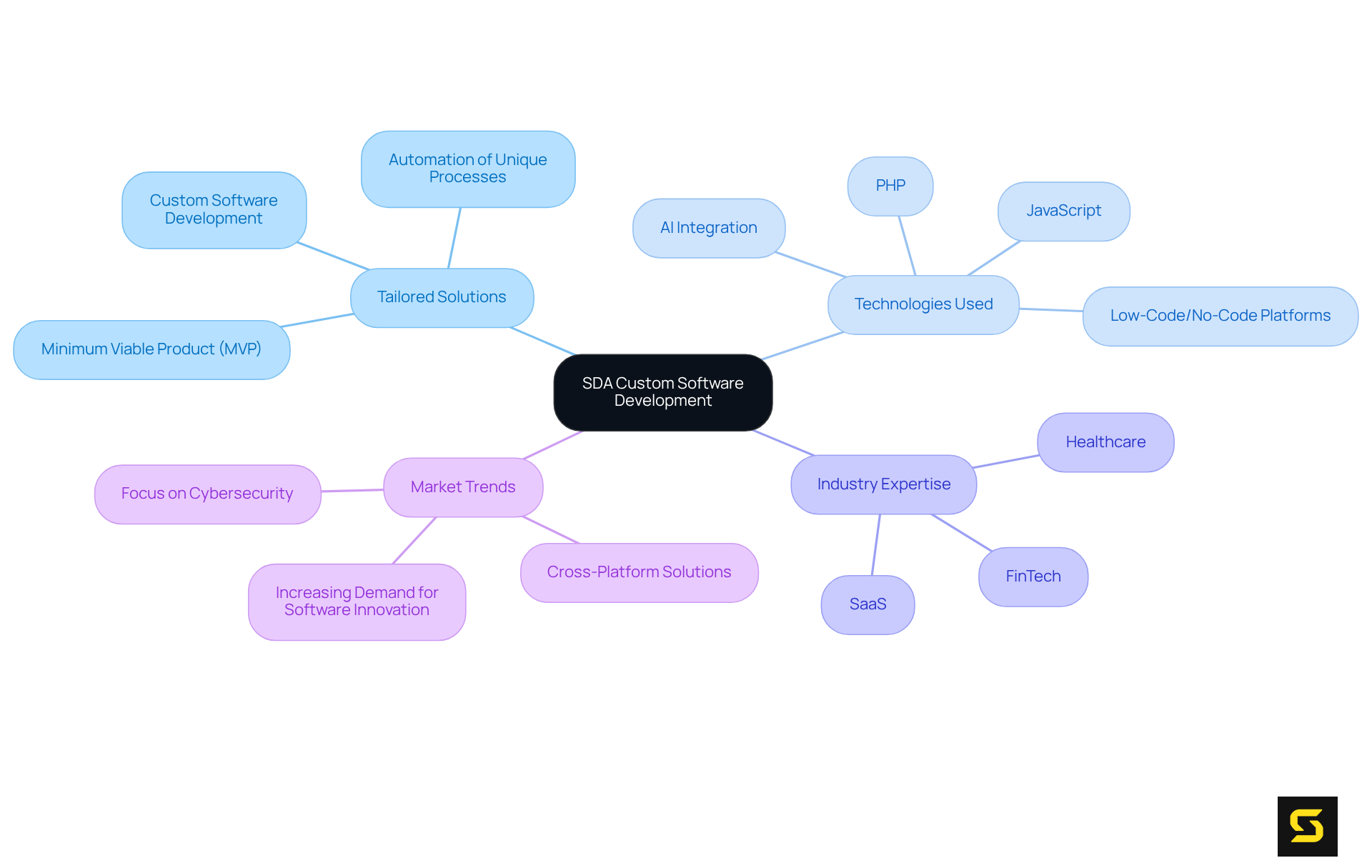
Define Your Minimum Viable Product (MVP) to Validate Ideas
Startups must embark on their journey by defining their Minimum Viable Product (MVP), which embodies the most fundamental version of their product that can be launched to gather user feedback. This strategic approach empowers new ventures to validate their concepts without substantial resource investment.
By concentrating on essential functionalities, startups can effectively gauge market demand and make data-informed decisions regarding future enhancements. Engaging with participants from the outset facilitates the refinement of the product based on real-world insights, ensuring that the final offering aligns with market needs.
Notably, startups that implement MVPs are twice as likely to succeed compared to those that do not, emphasizing the pivotal role of this methodology in driving innovation and mitigating the risk of failure. Furthermore, adopting a customer-centric design strategy is vital for crafting an MVP that resonates with users and fosters loyalty.
Startups should embrace the iterative nature of the MVP methodology, which promotes a cycle of build-measure-learn, enabling them to continually enhance their product based on user feedback. As Millie Gough, a Chief MVP Strategist, asserts, 'The MVP is a springboard, not a destination, for your entrepreneurial journey.'
To successfully navigate the MVP creation process, new ventures should devise a that delineates their goals and objectives, ensuring a clear trajectory from concept to completion.
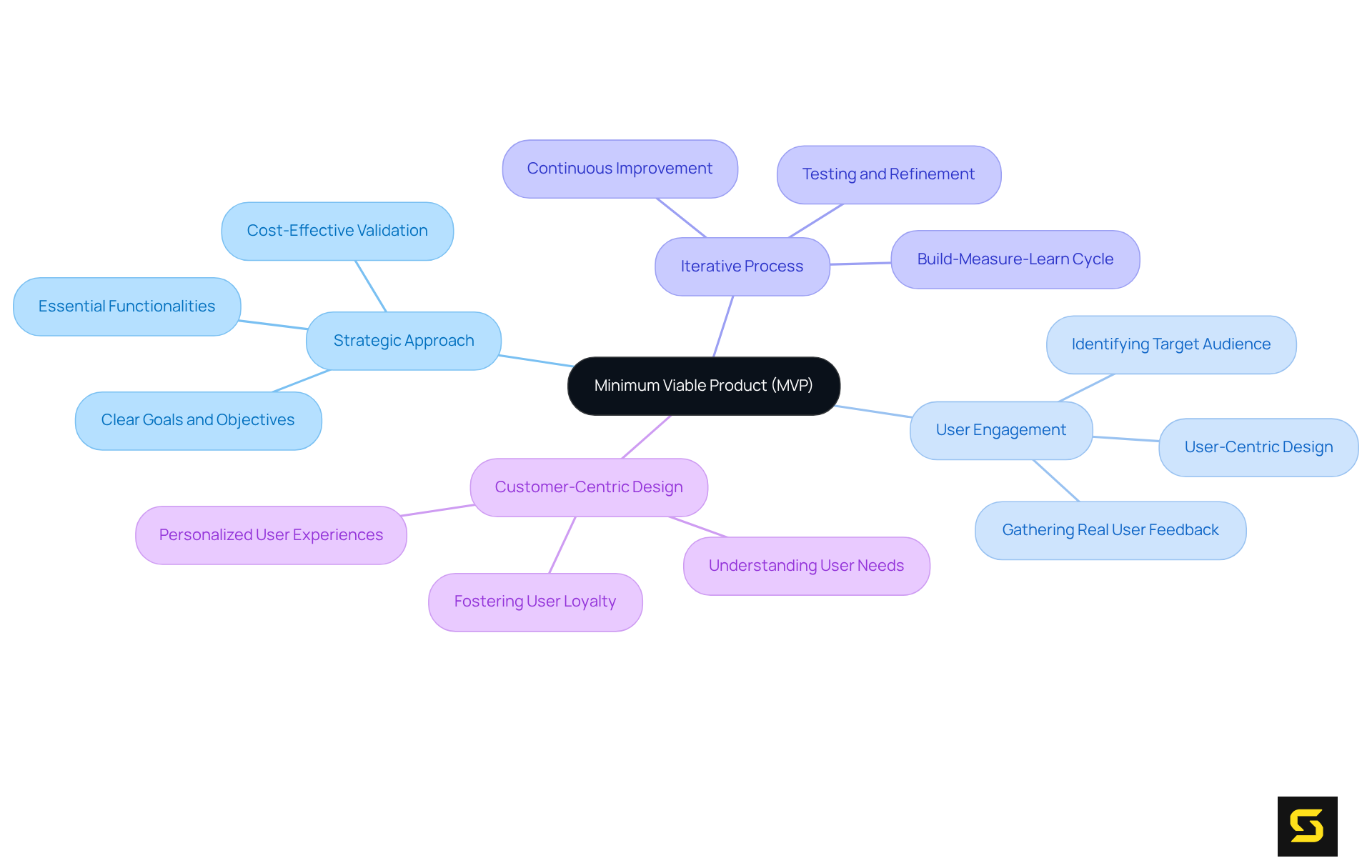
Select the Right Technology Stack for Scalability and Performance
For startups aiming for scalability and performance, selecting the right technology stack is crucial in the context of custom software development for startups. When engaging in custom software development for startups, factors such as:
- Anticipated user load
- Integration capabilities
- Expertise of their programming team
must be considered. Technologies like stand out for their flexibility and performance, while PHP proves effective for backend development. In custom software development for startups, a well-chosen stack not only meets current needs but also accommodates future growth, ensuring that software can evolve alongside the business.
As industry specialists note, "92% of business owners believe that having the right digital tools is the most effective strategy for achieving success in new ventures." Additionally, integrating low-code and no-code solutions can accelerate custom software development for startups and enable new businesses to adapt swiftly based on client feedback. Given that "70% fail during years two through five," making informed tech stack decisions early on is critical.
Startups should carefully evaluate their specific needs and team expertise when selecting a tech stack for custom software development for startups to maximize their chances of success.
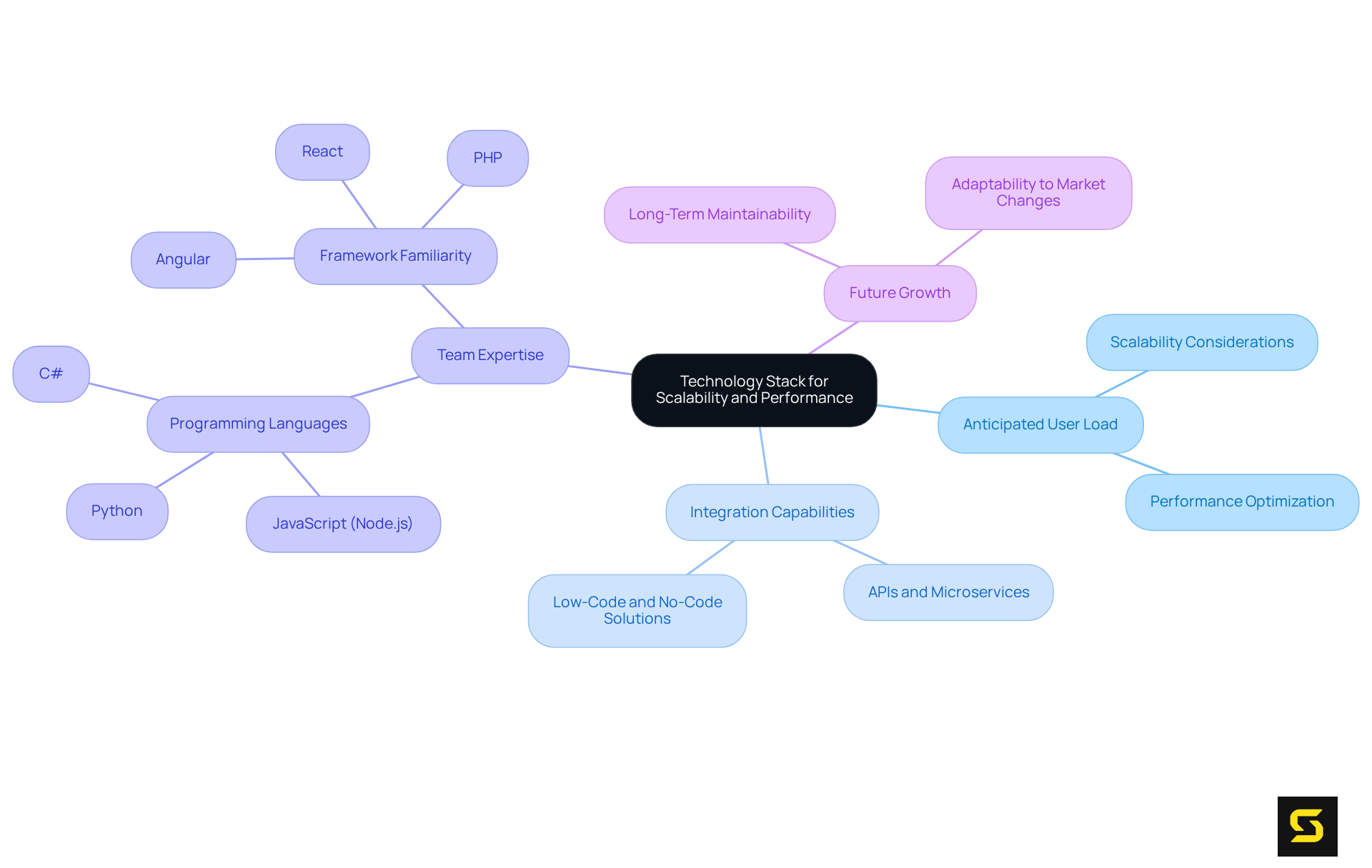
Implement Rigorous Quality Assurance Processes Throughout Development
Implementing rigorous quality assurance (QA) processes throughout the development lifecycle is crucial for startups involved in custom software development for startups striving for success in the competitive tech landscape. Regular testing and validation facilitate the early identification and resolution of issues, ensuring a reliable product at launch. Startups must adopt a comprehensive QA strategy that includes:
- Unit testing
- Integration testing
- Acceptance testing
This proactive approach not only enhances product quality but also cultivates user trust and satisfaction—elements that are critical for long-term growth.
Research demonstrates that organizations employing can achieve up to a 25% increase in team productivity, significantly enhancing their capacity to deliver quality products on time. Additionally, a development team at a new company that embraced Agile reported an impressive 40% reduction in bugs post-launch, underscoring the advantages of involving all team members in testing and soliciting customer feedback.
Incorporating automation into QA processes can further boost efficiency. For example, a mid-sized technology company cut its regression testing time by 70% through the implementation of Selenium for automated testing, enabling developers to focus on new features while simultaneously improving overall product quality.
Ultimately, fostering a culture of quality within the team is essential. Engaging all members in quality discussions and prioritizing key metrics—such as defect density and customer satisfaction—can lead to innovative solutions and a more dependable product. Moreover, organizations that actively monitor quality metrics are 50% more likely to achieve their project goals compared to those that do not. By focusing on these strategies, new ventures can significantly mitigate the risks associated with application failures that often stem from inadequate QA practices in custom software development for startups. As highlighted by the National Institute of Standards and Technology, the cost of rectifying a flaw post-launch can be up to 100 times greater than addressing it during the initial phases of development, emphasizing the financial implications of neglecting QA.
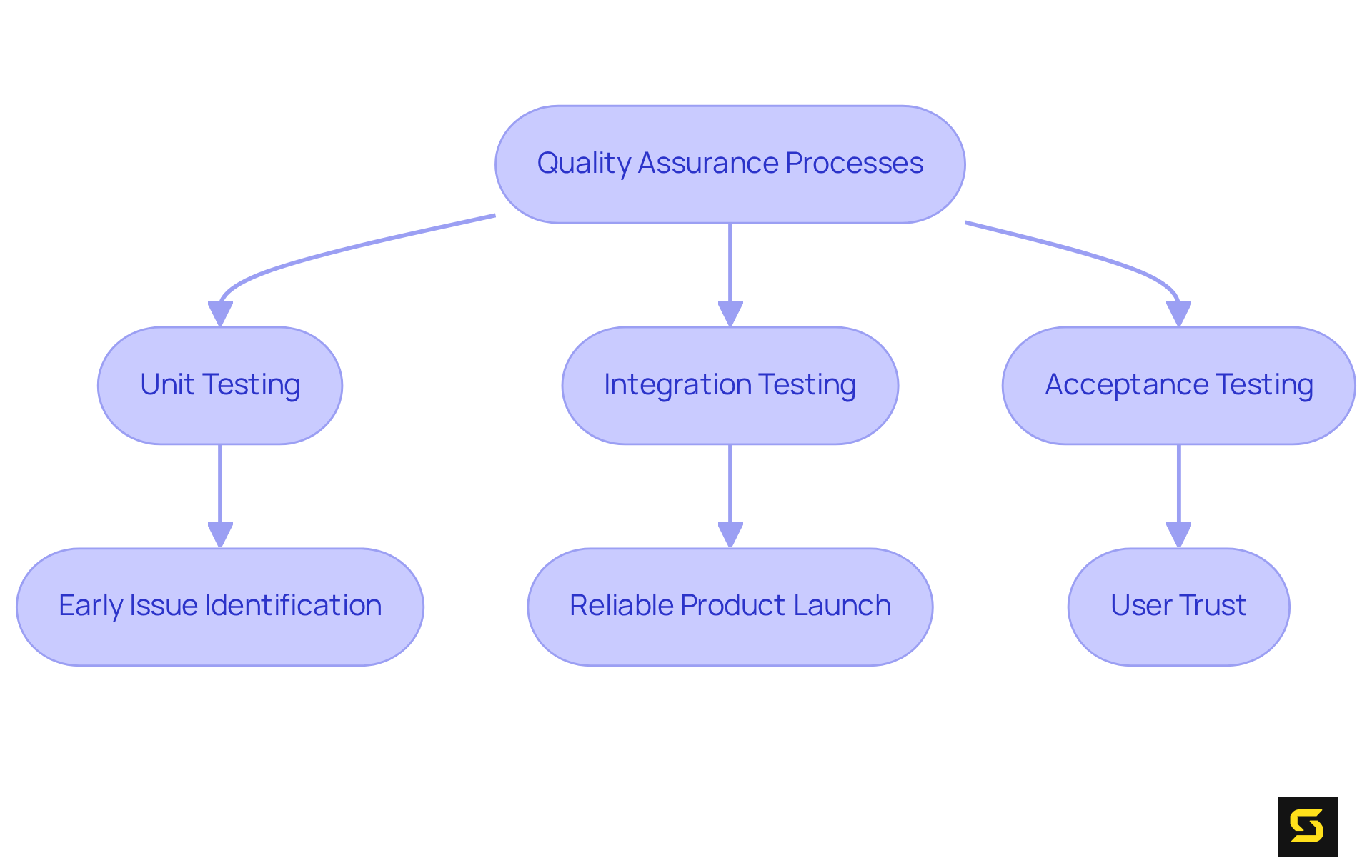
Adopt Agile Project Management for Flexibility and Efficiency
Adopting agile project management techniques is essential for startups striving to maintain adaptability and efficiency throughout the software creation lifecycle. Agile practices, including iterative development and regular feedback loops, empower teams to swiftly respond to evolving requirements and market dynamics. This cultivates robust relationships among team members and stakeholders, ensuring that the final product aligns closely with user expectations.
By embracing agile principles, new ventures significantly enhance their capacity for innovation and adaptability—key factors for success in today's competitive landscape. Notably, 61% of organizations have been deploying agile practices for over five years, underscoring its enduring relevance compared to traditional methodologies. Furthermore, nearly 50% of professionals are now leveraging generative AI within their agile frameworks, reflecting a trend towards integrating advanced technologies to boost efficiency and effectiveness.
As industry leaders emphasize, agility transcends mere methodology; it is a critical strategy for navigating the complexities of contemporary software creation.

Gather User Feedback Early and Iterate on Your Product
Collecting client feedback early in the creation process is essential for new businesses aiming to enhance their products efficiently. By involving participants during testing phases, these businesses can gather critical insights into usability and functionality. Research indicates that startups actively seeking feedback from customers early in their development cycle can achieve a 15% improvement in retention rates. Moreover, companies that leverage customer insights outperform their competitors by 85% in sales expansion, underscoring the vital role of client feedback in achieving market success. This feedback must be and applied to refine the product, implementing necessary modifications that elevate the user experience. Ongoing enhancements driven by feedback not only boost satisfaction but also ensure that the product remains relevant and competitive in the market.
As industry specialists emphasize, integrating consumer feedback fosters a sense of ownership, enhancing loyalty and support for the product. To efficiently collect feedback, new businesses should employ various methods such as:
- Online surveys
- Interviews
- Analytics tools to observe customer behavior
For instance, Dropbox utilizes customer interviews and NPS surveys to gain insights, ensuring a comprehensive understanding of client needs and preferences. Additionally, prioritizing feedback based on its potential impact on the MVP is crucial for effective implementation. By focusing on key issues identified through customer input, new businesses can achieve quicker iterations and enhance their product's overall quality.
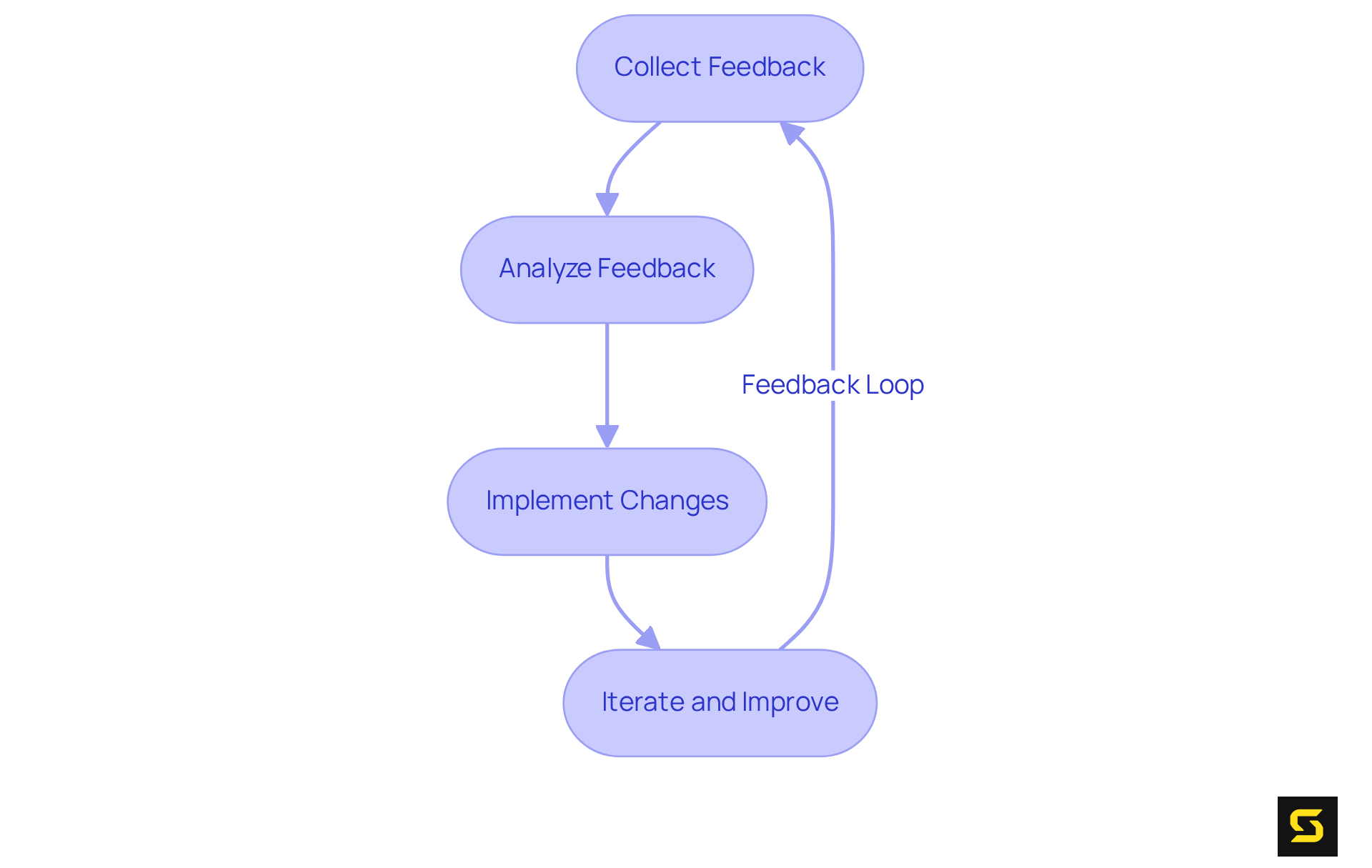
Plan for Comprehensive Post-Launch Support and Maintenance
For new businesses engaged in custom software development for startups, planning for comprehensive post-launch support and maintenance is not just beneficial; it is essential to keep their software functional and relevant. Establishing a dedicated support team is crucial to swiftly address inquiries and technical issues, ensuring that customer needs are met promptly. Regular should be scheduled to enhance performance and security.
Industry insights reveal that over 70% of new businesses recognize the necessity of planning for maintenance post-launch. By emphasizing post-launch assistance, new businesses can cultivate customer loyalty and satisfaction, which ultimately aids in the product's long-term success.
As Tony Hsieh wisely noted, pursuing vision rather than merely profit is vital; this vision encompasses a commitment to continuous quality and customer experience. By implementing these strategies, startups can effectively manage the complexities of maintenance through custom software development for startups, ensuring their products evolve alongside user needs and market demands.
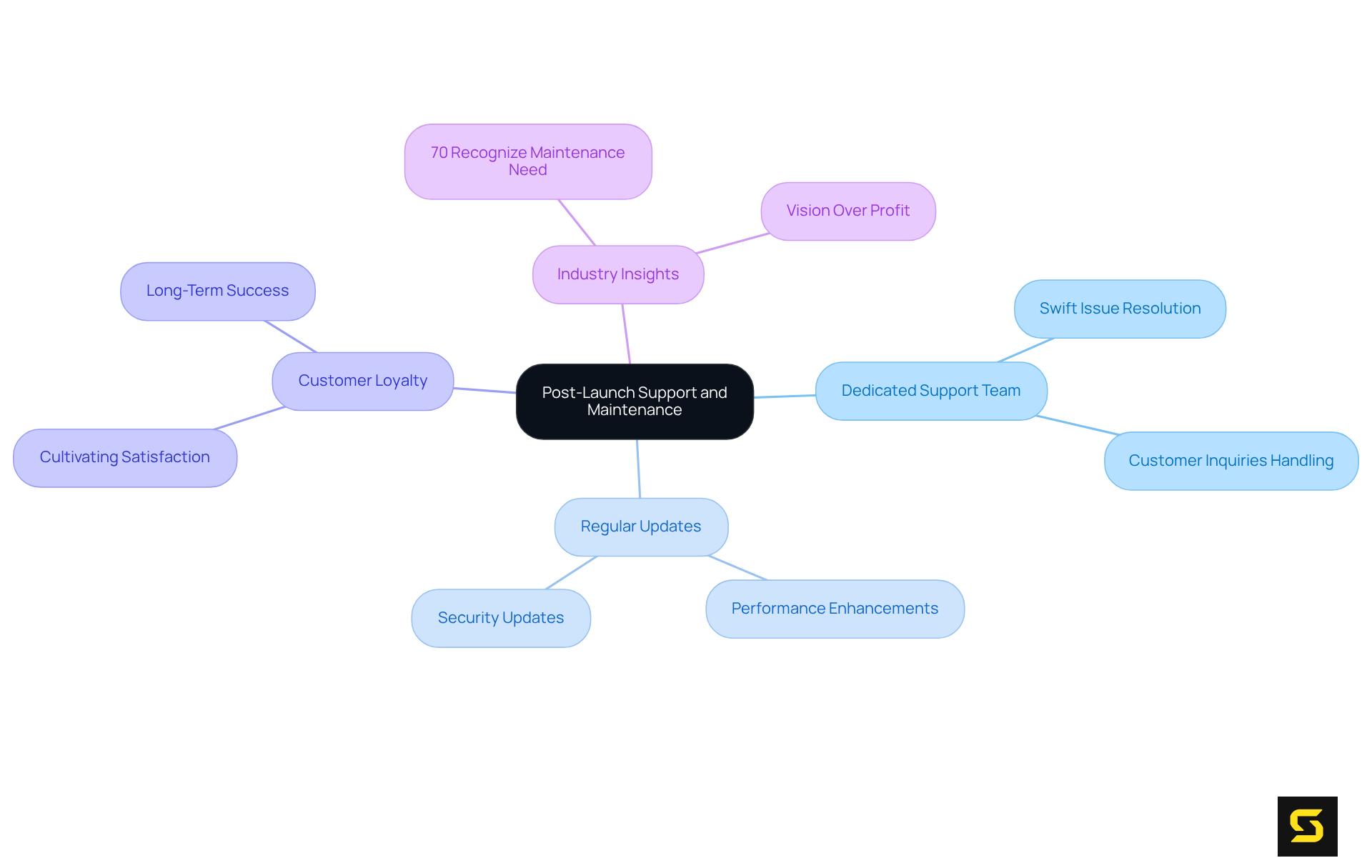
Differentiate Between Custom Software and Off-the-Shelf Solutions
Startups must recognize the critical distinction between tailored applications and ready-made solutions to make informed decisions regarding their technological needs, particularly in the context of custom software development for startups. Custom applications are meticulously crafted to meet specific business requirements, offering enhanced flexibility and scalability. In contrast, ready-made solutions may fall short in addressing unique challenges. By committing to custom software development for startups, these companies can ensure their applications are closely aligned with operational objectives and client expectations, ultimately driving superior results. This is not merely a choice; it is a necessity for achieving long-term success.
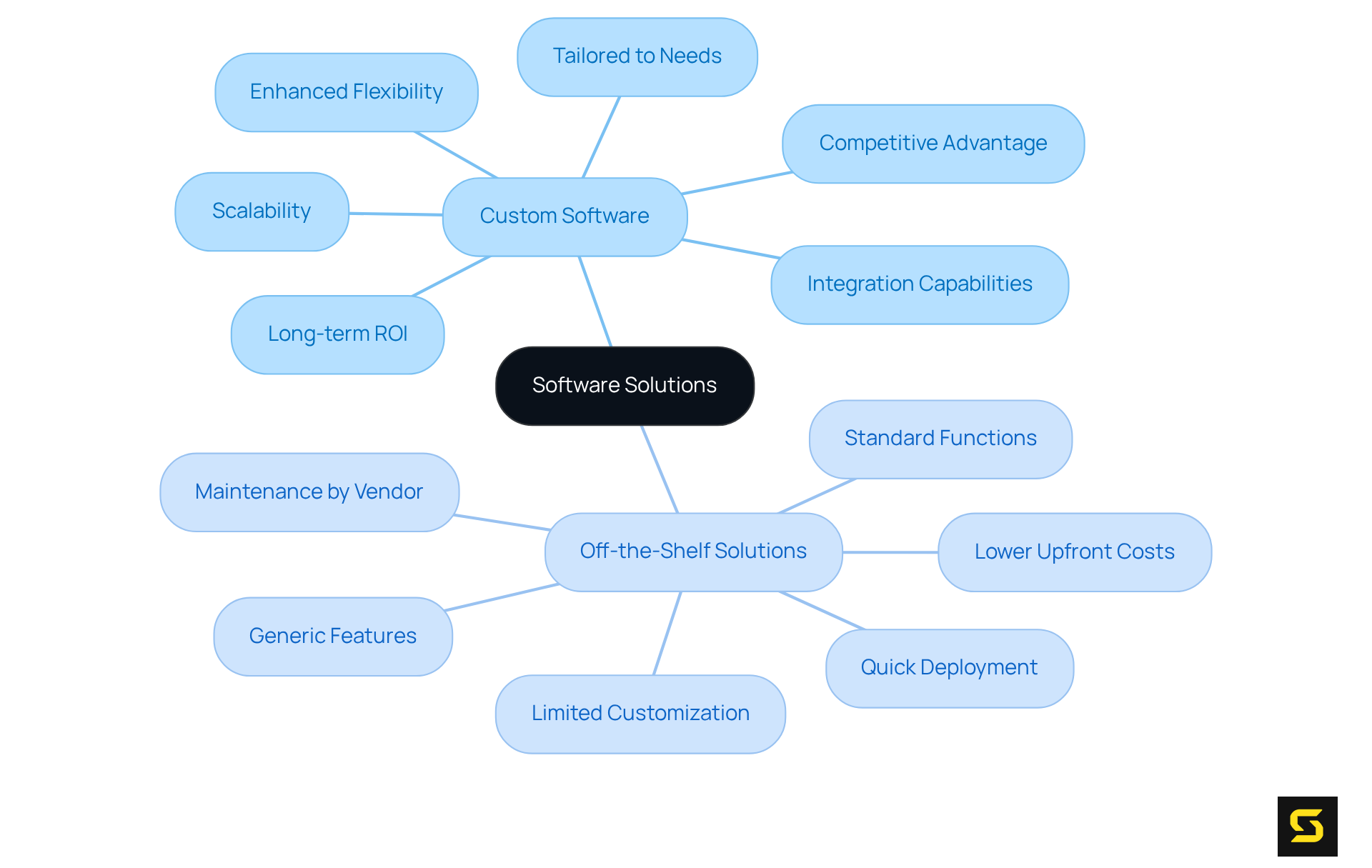
Maintain Clear Documentation for Future Reference and Updates
Maintaining precise records during the application creation process is not just beneficial; it is essential for future consultation and revisions. Thorough documentation must encompass technical specifications, user guides, and change logs. This ensures that all stakeholders, including developers and business owners, share a common understanding of the application's functionality. Well-documented projects facilitate , significantly reducing the risk of miscommunication and errors in future development efforts.
Expert opinions consistently highlight that effective documentation practices can enhance project success rates. In fact, 60% of developers report increased confidence when documentation is present, a factor that directly correlates with improved project outcomes. Startups can gain immensely from custom software development for startups that implements structured documentation strategies, such as utilizing templates and maintaining a centralized knowledge base. These strategies streamline onboarding processes and ensure that all team members remain aligned.
In technology companies, effective documentation methods often involve consistent updates to reflect changing application needs and the use of collaborative tools that enable real-time input from team members. Furthermore, tailoring documentation to the target audience's technical understanding is crucial for ensuring accessibility and usability. By prioritizing clear and accessible documentation, new ventures can cultivate a culture of transparency and accountability, ultimately propelling their projects toward success.
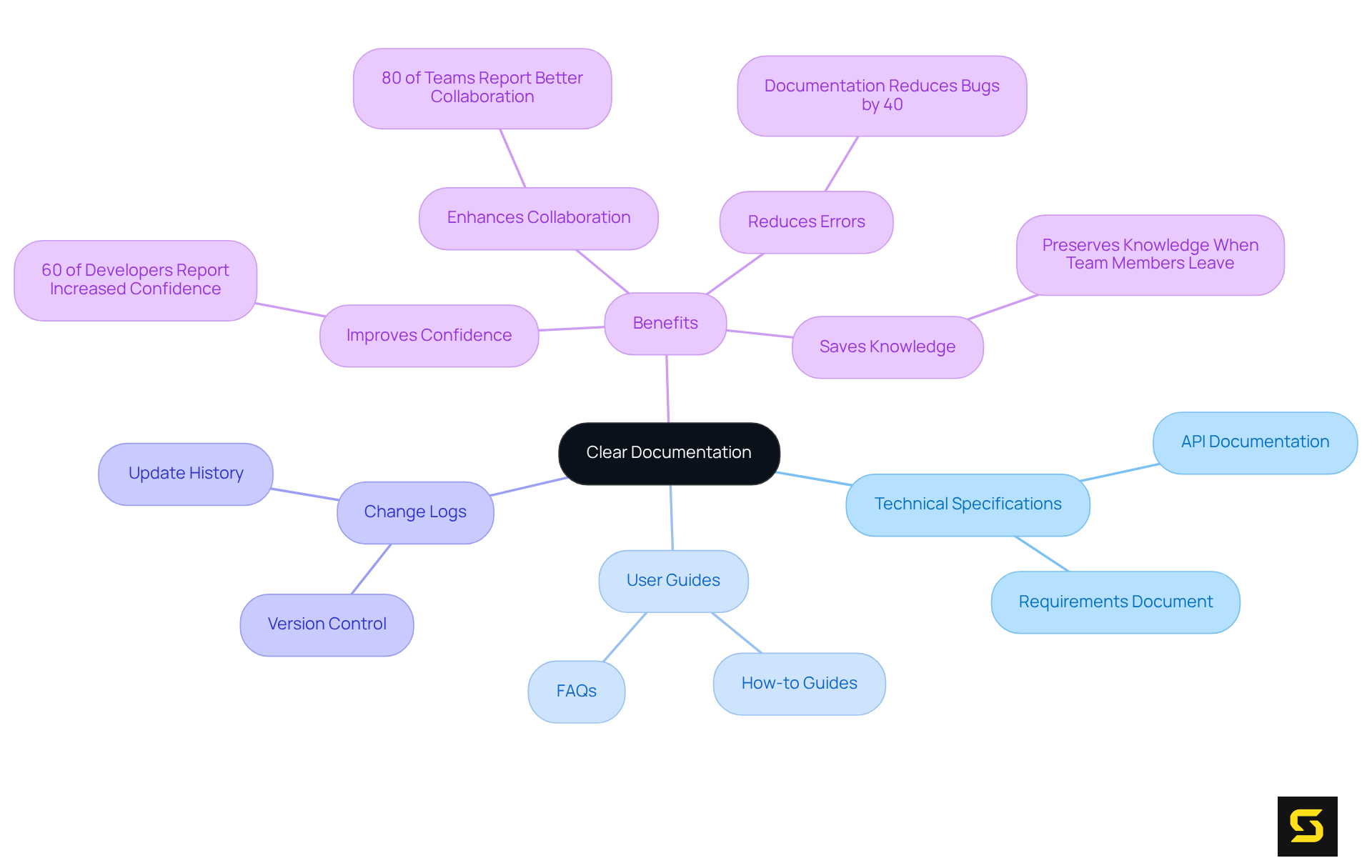
Select a Reliable Development Partner to Enhance Project Success
Selecting a trustworthy collaborator is essential for the success of a new business's project. Startups must prioritize partners with a proven track record in for startups and a comprehensive understanding of their specific industry. A robust alliance not only fosters teamwork but also ensures that the project team is completely aligned with the company's vision and goals.
By choosing the right collaborator, new ventures can leverage external expertise in areas such as:
- Coding
- UI/UX design
- Project management
- Quality assurance
This strategic approach enables them to effectively navigate challenges and accelerate their journey toward achieving business objectives. As industry leaders emphasize, partnerships built on trust and clear communication are foundational for overcoming obstacles and driving innovation.
Furthermore, as highlighted by Cloudester Software, "Experienced software development companies help prevent costly mistakes by anticipating potential issues early." New ventures should rigorously assess potential partners based on their experience, technical skills, and alignment with the venture's mission to ensure a fruitful collaboration.
Given that only 10% of startups achieve success each year, the significance of selecting the right partner cannot be overstated.
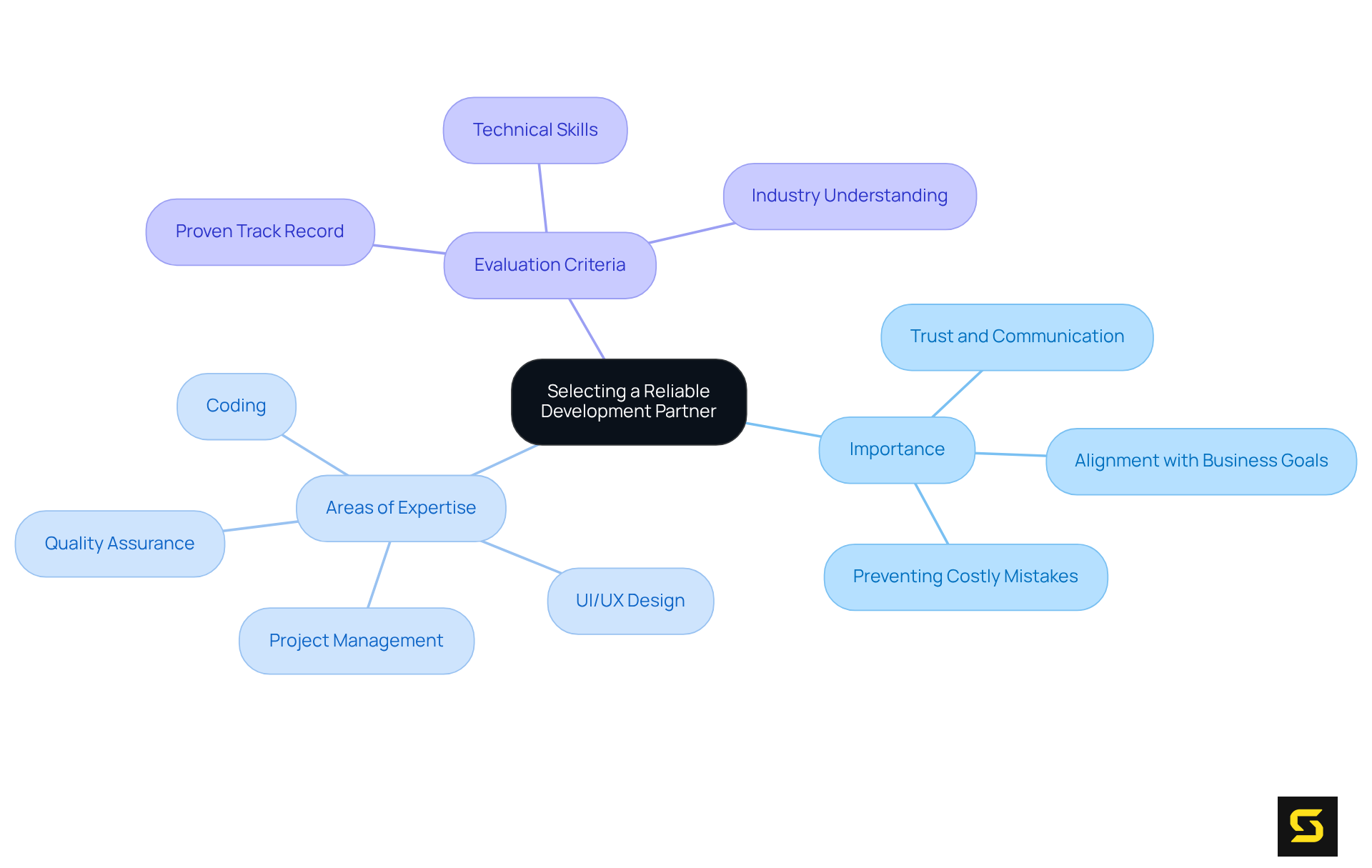
Conclusion
Custom software development stands as a pivotal factor in the success of startups, delivering tailored solutions that address the unique demands of emerging businesses. By grasping the nuances of custom software compared to off-the-shelf solutions, startups can make informed decisions that align with their operational goals and customer expectations. The journey commences with defining a Minimum Viable Product (MVP), facilitating early validation of ideas and significantly reducing the risk of failure.
Key insights throughout this exploration underscore the necessity of:
- Selecting the right technology stack
- Implementing rigorous quality assurance processes
- Adopting agile project management to enhance flexibility and responsiveness
Furthermore, gathering user feedback early in the development cycle is essential for refining products and ensuring they meet market needs. Planning for post-launch support and maintaining clear documentation are also critical for long-term success, as they enable ongoing improvements and foster customer loyalty.
In a competitive landscape where many startups encounter substantial challenges, the emphasis on custom software development is more crucial than ever. By leveraging these essential strategies, new ventures can navigate the complexities of the tech ecosystem, mitigate risks, and ultimately drive innovation. Taking proactive steps in these areas not only enhances the likelihood of success but also empowers startups to adapt and thrive in an ever-evolving market.
Frequently Asked Questions
What is SDA and what services do they provide for startups?
SDA is a premier supplier of custom software development specifically tailored for startups. They offer application development solutions designed to meet the distinct needs of new businesses, focusing on innovative digital solutions using technologies like JavaScript and PHP.
How does partnering with SDA benefit new ventures?
By partnering with SDA, new ventures gain access to extensive expertise across various sectors, such as healthcare and SaaS, ensuring that their software solutions are functional and strategically aligned with their business objectives.
What is a Minimum Viable Product (MVP) and why is it important for startups?
A Minimum Viable Product (MVP) is the most fundamental version of a product that can be launched to gather user feedback. It is crucial for startups as it allows them to validate their concepts with minimal resource investment and gauge market demand effectively.
How does implementing an MVP impact a startup's chances of success?
Startups that implement MVPs are twice as likely to succeed compared to those that do not, highlighting the pivotal role of this methodology in driving innovation and reducing the risk of failure.
What is the iterative nature of the MVP methodology?
The MVP methodology promotes a cycle of build-measure-learn, enabling startups to continually enhance their product based on user feedback, ensuring the final offering aligns with market needs.
What factors should startups consider when selecting a technology stack for custom software development?
Startups should consider anticipated user load, integration capabilities, and the expertise of their programming team when selecting a technology stack to ensure scalability and performance.
What technologies are recommended for custom software development for startups?
Technologies like React and Angular are recommended for their flexibility and performance, while PHP is effective for backend development.
Why is it critical for startups to make informed tech stack decisions early on?
Making informed tech stack decisions early on is critical because 70% of startups fail during years two through five, and the right digital tools significantly contribute to achieving success in new ventures.
How can low-code and no-code solutions benefit startups?
Integrating low-code and no-code solutions can accelerate custom software development for startups and enable them to adapt swiftly based on client feedback.





